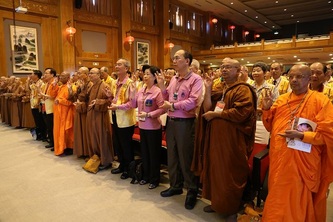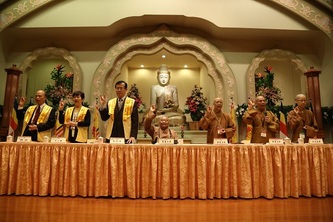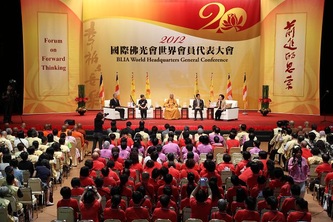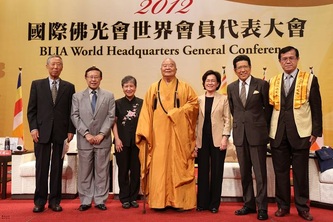
It has been twenty years since Buddha's Light International Association was inaugurated at the Los Angeles Music Center in 1992. As we look back at the past two decades, we see that BLIA members have propagated Humanistic Buddhism across the world, brought light and hope to humanity, served and contributed to society, and also left their own marks in history. I would like to take this opportunity to express my utmost admiration for your dedication.
Speaking of happiness and peace, what is the purpose of our existence in this world? Is it to find happiness? Or to experience suffering? Of course, most people would say, “Happiness!” In reality, how many people actually enjoy happiness and peace? What we hear and see most often are the wails of grief over the catastrophes of this world. These include natural disasters and man-made calamities such as war, violence, famine, poverty, and various stresses and anxieties experienced in everyday life. Very few people think of life as truly happy.
The average person is committed to becoming famous and rich, but is happiness and peace found within fame and fortune? The answer is not entirely yes. In general, people like to pursue money and love, but can happiness and peace be found within money and love? Again, the answer is a bittersweet yes and no. As for those who pursue freedom and democracy, even if the country is free and democratic, without inner peace and ease, life is still without true happiness and peace. Therefore, it can be said that the happiness and peace that have been sought by people for so long are in fact in the possession of very few.
How do we attain peace and happiness in life? I offer the following four suggestions:
I. Happiness and peace come from detachment and contentment
In this world, some people pursue material happiness and others pursue nature’s tranquility and peace, while some pursue material transcendence and spiritual happiness attained from detachment and contentment. So what type of happiness should we be pursuing? Material life may satisfy our daily needs, but it does not bring sustained happiness; only detachment and contentment allow us to enjoy lasting happiness.
As the saying goes, “a mind without desires makes a character noble.” A person may be without glamorous outfits or sensual enjoyments, but as long as he or she is not greedy for anything, he or she will naturally be noble in character. A person who is detached and without desires does not get jealous or compare himself with others, does not oppose or fight with others, and does not treat people or matters with arrogance and insolence, but follows any conditions with perfect ease. Take the many eminent and virtuous people throughout history, for example. They earned the respect of others not because of their wealth, but because of their moral integrity nurtured through living simple but content lives. They are the true models of living the philosophy of emptiness.
Only by liberating ourselves from the shackles of desire can there be hope in finding true happiness and peace. Yan Hui, a renowned disciple of Confucius, lived “with a bamboo dish of rice, a gourd vessel of drink” in perfect ease and peace. Tao Yuanming of the Jin Dynasty was willing to retreat from the trappings of officialdom to live a secluded life of farming and reading, carefree and content in “plucking chrysanthemums under the eastern fence and serenely gazing at the southern mountains.” Master Xuanzang of the Tang Dynasty “spoke no words of fame and gain; performed no superficial acts” while receiving royal patronage and remained detached from fame and gain to maintain his integrity. Master Hong Yi of recent times used the same towel for decades, and when a dish was too salty, he still consumed it with ease by saying, “Saltiness is a taste; so is blandness.” From the above, we can see that there were many people able to nurture a noble character by being content in poverty.
While most people pursue wealth and fame, they need to know that a beautiful life with a broader vision can be attained by “enjoying” instead of “possessing.” For example, although I do not own the mountains, rivers, lands, flowers, and trees, I can still wander through them in a carefree manner. Is this not happiness? While someone else may own the entire world and I do not, I can still enjoy the cool breezes and the bright moon. I can still care for the world I live in and regard all people as my brothers and sisters. To be able to enjoy the entire universe and the vast emptiness makes my world bigger and broader than owning a town, a city, a country or immeasurable wealth. Hence, life is not about the pursuit of what we can own, because no matter how much we have, we can never satisfy our greed. Enjoy life with a detached mind and happiness and contentment will be found everywhere.
I have always admired the Hakka expression given in response when you ask someone if he has eaten. Generally people would say, “Yes, I have eaten,” or “I am full.” But a Hakka does not respond in this manner, he tells you, “I am content!” This is quite interesting, because this expresses that not only has he eaten, but he is also very satisfied. A simple expression of “I am content!” shows so much ease and confidence. How can one be troubled by poverty? A content heart makes one the wealthiest person in the world.
Detachment and contentment give rise to the strengths of concentration and wisdom. The more detached you are, the more concentrated you can be, and thus, the more you are able to redefine the meaning and value of life. Just as Taiwan’s vegetable vendor Chen Shu-chu is detached from money, allowing her to give generously so that the value of money can be maximized. As such, she has won the respect of everyone.
Detachment and contentment means: there are things we should do, things we should not do in life; there are things that we should desire, things we should not desire in our minds. When we can be content, we will not be enslaved by life and will be able to settle both body and mind to enjoy the wealth and happiness of contentment. Therefore, detachment and contentment are true wealth, and people who understand detachment and contentment will naturally have happiness and peace in life.
II. Happiness and peace come from compassion and tolerance
Compassion is an asset jointly owned by all living beings; it is not exclusive to Buddhism. Only when there is compassion can humanity coexist in mutual prosperity. Upon the founding of BLIA, I composed the BLIA Verse to serve as the motto of life by which BLIA members worldwide should abide. The opening line, “May kindness, compassion, joy and equanimity pervade all Dharma realms,” is an expectation for all of us to open up our minds and emulate Avalokitesvara Bodhisattva’s spirit of great loving-kindness and compassion, bringing joy to all living beings and liberating them from suffering. In other words: to give kindness, compassion, joy and equanimity to all living beings.
Ch’an Master Jindai loved orchids, so he planted many precious orchid species in the temple garden. One day, as he was preparing to leave the temple to attend to certain affairs, he reminded his disciple to take care of the orchids during his absence. Unfortunately, while watering the plants, the disciple accidentally knocked over the shelf and broke the pots. He was full of shame and thought to himself, “I have destroyed my master's beloved orchid plants. Master is going to get so angry when he returns!” Upon Ch'an Master Jindai's return, the disciple acknowledged his mistake and asked his master for forgiveness. To his surprise, instead of scolding him, the Ch’an master comforted him and said, “I planted these orchids to beautify the environment and to offer them to the Buddha. I did not plant orchids so that I could get angry!”
As noted in a Buddhist sutra, “Loving-kindness ends greed; compassion ends anger.” If we can learn from Ch’an Master Jindai’s virtue and reflect upon ourselves by asking, “Did I make friends to get angry at them?” “Did I get married to get angry?” “Did I have children so that I could get angry at them?” “Did I start my career so that I could get angry?” Of course not! A change of perspective can put an end to greed and anger, resolving conflicts.
Compassion is not a demand on others, nor is it a standard by which we judge people. It is a way to discipline ourselves. Compassion does not mean blind tolerance to physical attack or verbal abuse. When justice is threatened or when good people are being slandered or attacked, we should stand up bravely for them. Compassion is not a momentary emotion, but a persistent service for others. Compassion is not just being kind only to our friends and family, nor does it mean we are to expect anything in return. Compassion is not always about praises and encouragement. Sometimes, in the interest of common well-being or to subdue the hard-headed, an angry expression is required to subdue villains. This is actually the greatest and most difficult form of compassion.
There are no enemies in the eyes of compassion. Compassion brings good affinities. Compassion harmonizes self and others, and is one with the universe. As the saying goes, tolerance fosters greatness; with compassion and tolerance, we can naturally unite people and create many supporting conditions. Confucius traveled to different regions to teach and had no fixed home, yet he still had a following of three thousand disciples. The Buddha traveled across India to teach the Dharma, and many of his assemblies were attended by a million people and heavenly beings alongside the regular entourage of 1,250 followers. Different people have different characteristics and needs, hence, it is difficult to please them all. If we can treat others with a kind and tolerant mind, we will certainly develop good affinities broadly and receive the support of many.
However, compassion and tolerance alone are not enough. They need to be supplemented by wisdom. In this world, the meaning of compassion is often distorted, leading to excessive indulgence and turning a blind eye to what is wrong. When applied inappropriately, compassion can become the source of crimes and wrongdoings. For instance, the common practice of freeing live animals actually causes harm to more animal lives. Inappropriate and lavish giving of money only nurture greed and corruption. Therefore, true compassion and tolerance must be supplemented by prajna wisdom to prevent traveling down the wrong path, rendering the initial intentions futile.
Once, a young man had a quarrel with his neighbor over a wall. He wrote to his father, an imperial minister, hoping that he would help him win this wall dispute. Being a reasonable man, the father replied, “A letter sent across ten thousand miles just for a wall, what harm can there be in yielding him three feet of space? The entire length of the Great Wall of China is still intact, yet Emperor Qin (who built it) is no longer around.” These simple words are sufficient to explain the interaction between people as well as the wisdom and art of tolerance.
According to the sutras, “there is a world in a single flower; a buddha in a single leaf.” Within a grain of sand, a piece of rock, a flower or a single leaf, we can see the three thousand great chiliocosms. This means that all matters in nature coexist in mutual prosperity. The same applies to people. Differences in character, thinking, and belief need to be tolerated. The different religions, races, and skin colors among nations require even more tolerance.
Looking at the conflicts in this world, they are usually caused by intolerance between different nations, cultures, races, and religions. Poverty gaps and social stratification are the causes of various conflicts, a problem faced by humanity as a whole. If we wish to be free from these dilemmas, compassion and tolerance are the only solution. Only compassion and tolerance can awaken people’s morals and conscience for society to flourish and improve. Only compassion and tolerance can help to resolve conflicts, prevent wars; only compassion can enhance and sustain world peace.
It is my hope that from today forward, all BLIA members can spread the spirit of compassion and tolerance from self to their family, society, and to the entire world and humanity. Only when the world is filled with compassion and tolerance, can we have lasting happiness and peace.
III. Happiness and peace come from letting go and picking up with perfect ease
Very often, we hear people complaining about the stresses and anxieties of life, and relationships that become too much to bear. Exactly what is causing this lack of peace for the body and mind?
When we feel too much pressure in this world, it is usually due to our lack of willingness to let go. For example, when we were young, we were most likely caring too much about who our parents loved more. In school, we compared grades with our classmates. As adults, we worry about whether or not our friends will look down upon us. In running a business, we calculate profit and loss daily. When we are sick, we worry about suffering and death. When we are old, we worry that there will be no one to take care of us.
Unable to let go, the human mind is constantly worried about all kinds of interpersonal problems, troubled by disputes over right and wrong, and plagued by all types of comparisons. Once, a Brahmin brought two vases to see the Buddha. Upon seeing him, the Buddha said, “Let go!” and the Brahmin put down one of the vases. Again, the Buddha said, “Let go!” and he put down the other vase. However, the Buddha continued to say, “Let go!” Confused, the Brahmin said, “I have already put down everything that I was holding, what else would you like me to let go of?” The Buddha replied, “What I am telling you to let go of is not the vases, but of unwholesome thoughts and emotions such as your arrogance, pride, anger, jealously, and hatred.”
I often use the suitcase as a metaphor for life: we pick it up when we need to, and we let go of it when it is time to do so. When we pick up something, we should be able to shoulder the responsibility with courage, with the resolve and sense of mission in serving. When it is time to let go, we should also follow conditions and let go in a calm and composed manner. The ability to let go makes it easy to pick up again. When you are willing to take a step forward, there will be hope for the future.
There was once a puppy running around in circles chasing after its own tail. An older dog saw this and asked, “What are you doing?” The puppy replied, “Someone said that a dog’s happiness is on its tail, so I am chasing after my happiness.” The dog then said, “You can never find happiness by chasing after your own tail. All you need to do is walk forward with your chin up, and happiness will follow you naturally.”
In picking up, we are picking up right mindfulness, right actions, right speech, right thought, compassion, morality, good conditions, and diligence. In letting go, we should have the flexibility to be big or to be small, to give or to take, to have or not to have, and to stay high or to lie low.
We should let go of our greed for fame and gain as well as the attachment to troubles and defilements. We should even let go of the delusive thought of having to let go of something. Just as the Sixth Patriarch Huineng indicated, “Inherently, there is no thing, where can it attract dust?” this is true letting go. As the saying goes, “With a troubled mind, even heaven and earth become small; with a mind at ease, just a bed can be big and broad.” Once we let go of our attachments, we will be so carefree and at ease!
Picking up and letting go are two sides of the same coin; they are equally important. To pick up does not mean to fight for something; it is a resolve, a form of tolerance, and wisdom. To let go does not mean to ride on a loose rein and indulge oneself; it is the bodhisattva spirit of giving, only making contributions and not expecting anything in return.
Throughout history, many sages and eminent people were respected because they placed the wellbeing of others before their own and never thought of personal gains, even sacrificing their lives. Wen Tianxiang of the Song Dynasty was captured by the Yuan army during a resistance war. The enemies lured him with the position of a prime minister, but he remained unmoved and wrote the “Song of Integrity” in jail to state his will, thus, leaving a good reputation in history. Confucius expressed, “Sacrifice one’s life to preserve one’s virtue,” and Mencius said, “Give life for righteousness.” Guan Yunchang exhibited a “righteousness soaring high into the clouds” and nourished “a vast, flowing nature,” while Fan Zhongyan stated, “Bear hardship and bitterness before others; enjoy comfort and happiness after others.” These are all paradigms that show by letting go of the smaller self, a greater self is accomplished.
Furthermore, there was Sakyamuni Buddha, the founder of Buddhism, who relinquished the palace life of a prince for treading on the path of spiritual cultivation. Eventually, he attained enlightenment and spent his life spreading his teachings across India to help all beings to be liberated from suffering and attain joy. Knowing to let go allows us a much bigger world; being brave to pick up permits our short and limited life to be more at ease. Because we learn to give, naturally, happiness and peace will follow us.
IV. Happiness and peace come from altruism and selflessness
No man is an island. We all must rely on various causes and conditions to survive. In other words, the life of a person is closely tied to all walks of society. However, the greatest flaw of humanity comes from selfishness and attachment. For example, people usually give with expectations of reciprocation; the more they give, the more they expect to receive in return. When their expectations are not met, they become troubled. That is why Buddhism advocates the sublimation of moral character through compassion and the purification of our worldly sentiments with rationality.
As the Buddhist saying goes, “Complain not of a temple’s bland tea and food, for the sentiment of a monastic is far less strong than that of a worldly person.” Without selfishness and attachment, what appears to be heartless actually embodies boundless compassion and wisdom. Only within simplicity can the greatest truth be found; only within the most ordinary can a longstanding path be found.
Zi Xia once asked Confucius, “What are the ‘Three Impartialities?’” Confucius said, “Heaven covers all without partiality; earth sustains and contains all without partiality; the sun and moon shine on all without partiality.” This means that because heaven and earth are impartial, they can be large; because the sun and moon are impartial, their light can shine in every direction. If we wish to achieve major accomplishments in life, we must be impartial and always strive for the well-being of others and the general public. Then naturally, we will be supported by the right conditions to succeed. People who only think for themselves will not only lack the affinity and support of others, but will also encounter difficulties in accomplishing tasks without the strength afforded by teamwork. Being selfless and altruistic expands our hearts and saves us from being self-centered. Wu (nothing or without) does not mean to be without principle, nor does it mean no distinction between right and wrong; rather, wu means to be steady in principle and to have compassion that transcends all.
One day, when Confucius's distinguished disciple, Yan Hui, was out running errands, he saw two men fighting in front of a fabric store. The seller asked the buyer for twenty four dollars, but the buyer shouted, “If it’s three dollars per foot for this fabric, and 3 x 8 = 23, why should I pay you 24?”
Upon hearing this, Yan Hui approached the buyer and said, “My friend, your calculations are wrong. 3 x 8 = 24, that is the amount you should pay.”
Refusing to comply, the buyer angrily pointed at Yan Hui and said, “What gives you the right to speak? Only Confucius is qualified to decide whether 3 x 8 = 23 or 24. Let’s go ask him!”
“Fine! Confucius happens to be my teacher. What are you going to do if he says you are wrong?” asked Yan Hui.
“If I am wrong, I will give you my head. But what if you are wrong?”
“If I am wrong, I will give you this hat that I am wearing on my head.”
The two went to Confucius and explained the dilemma to him. Confucius immediately turned to Yan Hui and said, “Yan Hui, you have lost. 3 x 8 is 23. Give him your hat!” When he heard this, Yan Hui felt like the world had been turned upside down, and he thought, “Can it be that Teacher has lost his mind?” However, since he never disobeyed his teacher, he quietly took off his hat and gave it to the buyer.
Afterwards, the more Yan Hui thought about the incident, the more troubled he became. Finally, he could not help but ask, “My teacher, is 3 x 8 = 23 or 24 after all?”
In response, Confucius asked him, “Tell me, which is more important, someone’s head (life) or someone's hat?”
“Someone life, of course!” replied Yan Hui.
“That is correct. If I said 3 x 8 = 23, a hat would be all that you lose, but if I were to say 3 x 8 = 24, then he would have lost his life!” said Confucius.
In Buddhism, nothing remains fixed and unchangeable. Since rules can be flexible, 3 x 8 can be 24, 23, or even infinity. There is no need to be attached to a fixed answer. This is the wisdom of a sage. In daily life, each and every thought can be a point for cultivation. If we can face the world with selflessness, altruism, detachment, and no desires, then we will naturally have respect and tolerance for everything. As such, our lives will benefit so much more, and happiness and peace will come naturally.
Since its establishment, BLIA has selflessly and altruistically served society. I hope that when we are serving others, we are also making our lives more meaningful at the same time. With selflessness, we can embody the public; by placing others before ourselves, our minds will be broadened by being selfless. With altruism, we can reduce our attachments; we will think for others, society, and our country. Selflessness and altruism open up our minds and broaden our vision, allowing us to find happiness and peace in life.
To sum up, happiness and peace are what everyone seeks and the vision all humanity strives to attain. A happy outlook in life brings peace in living. It is my hope that all BLIA members and friends from all directions can nurture a character of contentment and detachment, have a mind of compassion and tolerance, learn to pick up and let go with perfect ease, and achieve a character of selflessness and altruism. Let us work together, contribute to the happiness and peace of humanity, and build a “Humanistic Buddhaland” that is filled with happiness and peace here and now.
Last but not least, may your hearts be filled with Dharma joy, and may each and every one of you live a life of happiness and peace.





 RSS Feed
RSS Feed
